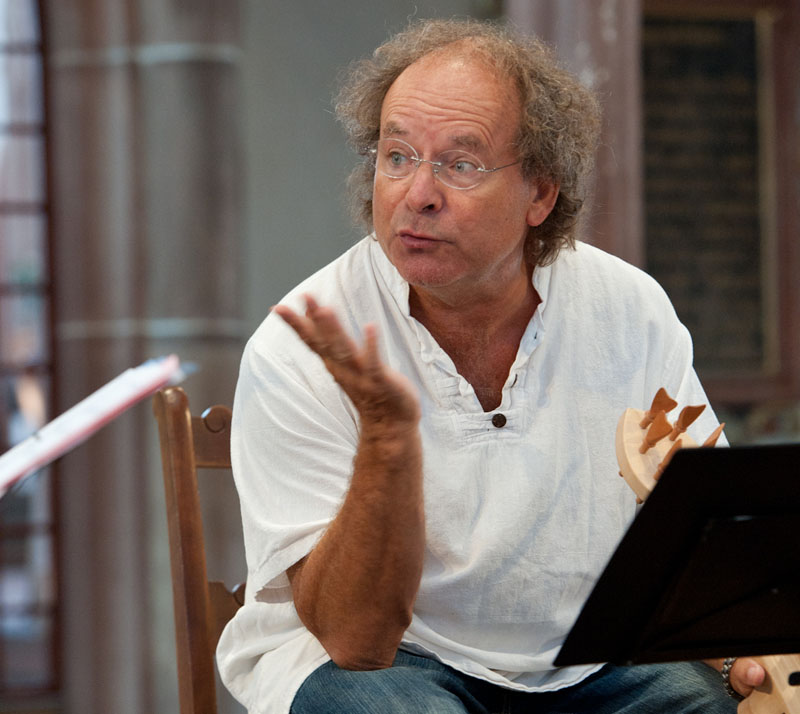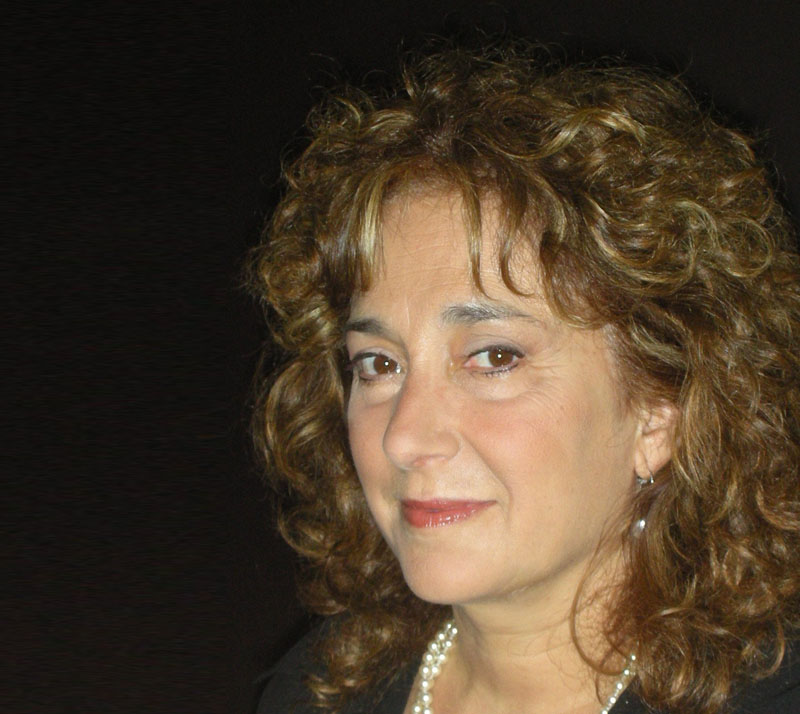The London Settimana Musicale del Trecento
The course
Dear SMT friends! As you might know, there won't be a summer course in Arezzo in 2024. However, a medieval music course in London will be held at the wonderful SandsFilmsStudio with the same team of teachers as all previous years.
(https://www.sandsfilms.co.uk/)(https://www.sandsfilms.co.uk/contactaddress.html)
Our London "Settimana" will take place from October 16th till October 20th, 2024. The Arezzo Settimana will take place again in May or June 2025, to be confirmed.
The London course will prioritize British students, or students currently living in the UK, but everybody can still apply to participate. There will be a waiting list for students outside the UK; of course, all the students will be considered in the final decision. An audition or video demo is necessary for all participants, to be sent by Wetransfer to ilsecron50@icloud.com or jillann52@me.com
Repertoire
The course is conceived for all students who wish to deepen their understanding of serious medieval repertoire while developing their skills in performance. The London Settimana will also welcome "modern" instrumentalists who wish to come into contact with this marvellously complex repertoire.
Our subject this year will be the 4-part chansons from the famous ars subtilior manuscript, the Chantilly Codex. They form the closing section of the codex, together with a number of motets.
Kees Boeke
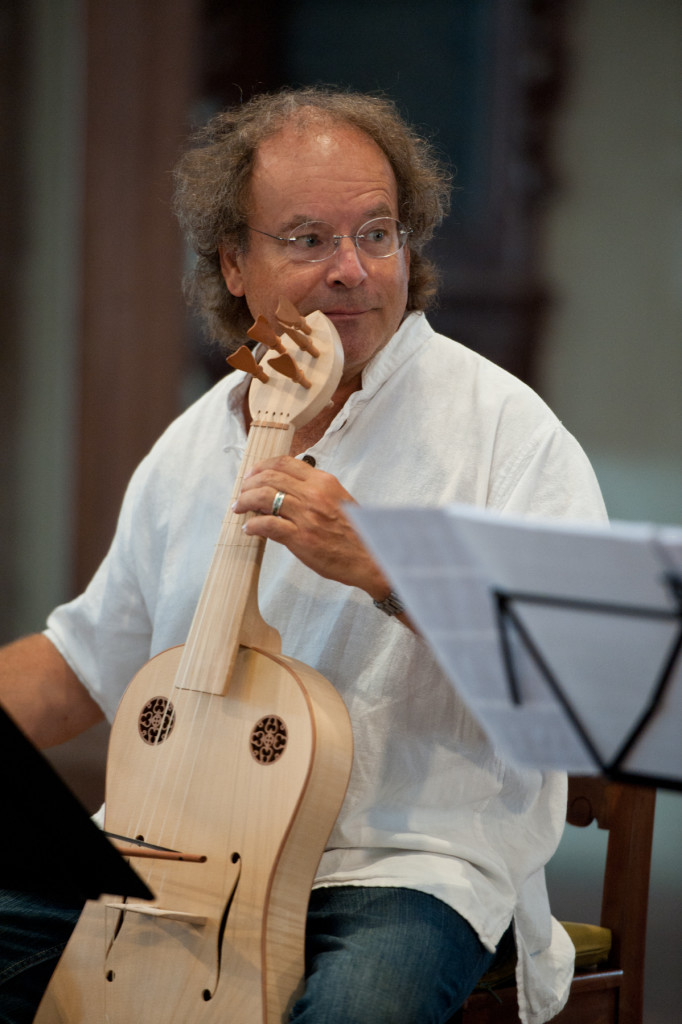 Kees Boeke was born in Amsterdam. He studied recorder with Frans Brüggen and cello with Anner Bijlsma at the Royal Conservatory in The Hague. After graduating with honours in 1969, he founded the Quadro Hotteterre. He was also a member of Kees Otten’s Syntagma Musicum for many years and a cofounder of Sour Cream (1972), Little Consort Amsterdam (1978), and Mala Punica (1989).
Kees Boeke was born in Amsterdam. He studied recorder with Frans Brüggen and cello with Anner Bijlsma at the Royal Conservatory in The Hague. After graduating with honours in 1969, he founded the Quadro Hotteterre. He was also a member of Kees Otten’s Syntagma Musicum for many years and a cofounder of Sour Cream (1972), Little Consort Amsterdam (1978), and Mala Punica (1989).
In 1970, Kees Boeke began his teaching activities in The Hague and at the Sweelinck Conservatorium in Amsterdam. Since 1990, he is Professor of Recorder and Early Music at the Hochschule für Musik und Theater in Zürich, Switzerland. In 2005, he was named full professor of Medieval and Renaissance Music studies at the Institut für Alte Musik in Trossingen, Germany.
He has given seminars and master classes in recorder and early music around the world including the Deller Academy (Lacoste, France 1972-1982), Corsi Internazionali di Musica Antica (Urbino, Italy 1975-1982), Early Music Festival, Vancouver and has been artistic director of the International Early Music courses at San Floriano (Polcenigo, Italy 1983-1993). From 1989 on, he collaborated with the Accademia Musicale Chigiana in Siena, for whom he produced Ludovico da Viadana’s Vespers (Salmi a 4 cori, 1612) in 1994.
In 1996, Kees Boeke began his work as musical director for the ensemble Cantica Symphonia with whom he has made recordings of the Motets by Costanzo Festa and Masses by Guillaume Dufay. He has been invited as guest conductor by the vocal and instrumental ensemble “L’Homme Armé” in Florence and by the ensemble Ars Nova Copenhagen for concerts in Holland, Belgium and Denmark. Over the years, he has collaborated with the Hilliard Ensemble in concerts and recordings of the music of Heinrich Isaac, Orlando di Lasso, and Philippe de Monte.
Kees Boeke has recorded over 70 records and CD’s for Teldec, Das Alte Werk, EMI, RCA, Nuova Era, Channel Classics, Arcana, Symphonia, Attacca, Erato, Philips, Stradivarius, Glossa, Mirare and his own label Olive Music.
In the realm of contemporary music, Kees Boeke forms an electronic recorder duo, Duix, with Antonio Politano. The ensemble specializes in performance on bass recorders, with emphasis on new music by Italian composers. Kees Boeke is himself an active composer (Donemus, Amsterdam, Sheetmusicnow.com ) and editor of early and contemporary music (Zen-On, Tokyo; Schott, London).
Since 2001 he has worked closely with Professor Laurenz Lütteken (University of Zurich) in projects and seminars in the field of Medieval, Renaissance and Baroque music. In 2003, he started his CD label Olive Music, along with his wife, singer Jill Feldman. In addition, the two founded a new ensemble "Tetraktys" for medieval music. The Tetraktys programs include, among other things, the Trecento, Chansons by Dufay and contemporaries, the Squarcialupi Codex, the complete recording of the Chantilly Codex, works of Ciconia, sacred and secular works by Matteo da Perugia, the Songbook of Johannes Heer etc.
Since 1980 Kees Boeke lives in Tuscany, where he produces extra virgin olive oil.
Claudia Caffagni
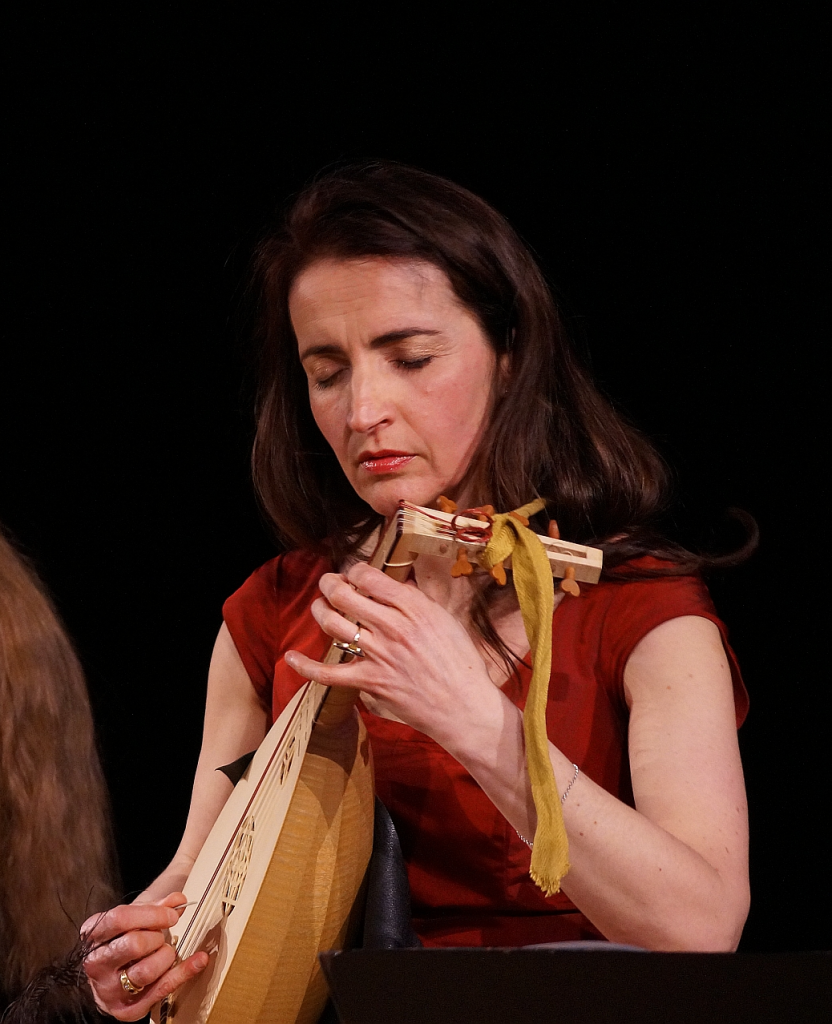 Claudia Caffagni was born in Bologna into a musical family. She started studying the lute with her father Mirco at the age of thirteen and later with Federico Manicola. From the beginning of her musical education, she has held a deep interest in problems of performance practice in repertoire that covers the wide range of early music from the Middle Ages to the Baroque.
Claudia Caffagni was born in Bologna into a musical family. She started studying the lute with her father Mirco at the age of thirteen and later with Federico Manicola. From the beginning of her musical education, she has held a deep interest in problems of performance practice in repertoire that covers the wide range of early music from the Middle Ages to the Baroque.
She obtained her diploma in Lute performance in 1989 at the Royal College of Music in London, where she studied with Jakob Lindberg. She then specialized in German baroque lute repertoire for a year at the Schola Cantorum Basiliensis with Hopkinson Smith. Apart from her practical studies, she became particularly interested in the sources, notation and treatises of medieval repertoire especially. In 1984, she founded her Ensemble LaReverdie, one of the most important groups internationally active in the reconstitution of pre-renaissance music. With this ensemble she has performed at the most prestigious festivals of all Europe. She has recorded sixteen CDs for ARCANA, in co-production with WDR. All CDs have obtained prizes including the Diapason d’Or de l’Année 1993, and "Finalist" in the 2010 and 2013 Midem Classical Awards, Early Music.
In 1995 she obtained a master (with honours) in Architecture at the Istituto Universitario di Architettura di Venezia, with a thesis entitled: "Il temperamento in musica e in architettura: "La Schola Riccatiana" (Fidia Edizioni d’Arte, Milano-Lugano, 2011). This thesis was published by the editor Leo Olschki for her lecture for the Fondazione Cini di Venezia in 2010, dedicated to Giordano Riccati.
She recently published an article entitled "Omaggio a Johannes Ciconia. Marce Marcum imitaris: un modello per i mottetti di Ciconia" for the magazine Marcinum, 2012. A new article will come entitled "A new edition of the Italian Trecento motet Marce, Marcum imitaris" for the Journal of the Alamire Foundation.
To celebrate the twentieth anniversary of the Ensemble LaReverdie (1986-2006) she prepared a new critical performing edition of Guillaume Du Fay's Missa Sancti Jacobi, directly transcribing the Mass from its main manuscript source, the Codex Q15 from the Bologna, Civico Museo Bibliografico Library. It was presented in 2014 for the "Premio Luigi Gaiatto" promoted by the Fondazione Ugo e Olga Levi where it received an honorable mention.
Claudia has been a teacher of Early Music performance practice at the Conservatory "G. Tartini" in Trieste and has held seminars and courses in lute and medieval music in Italy and abroad. Since 2005 she has taught international early music courses in Urbino, Parma, at the Accademia Internazionale di Musica (Scuola Civica) in Milan. From 2007-2015 she has taught medieval and renaissance notation as well as plectrum lute at the Department for Medieval and Renaissance Music at the University of Music in Trossingen.
Jill Feldman
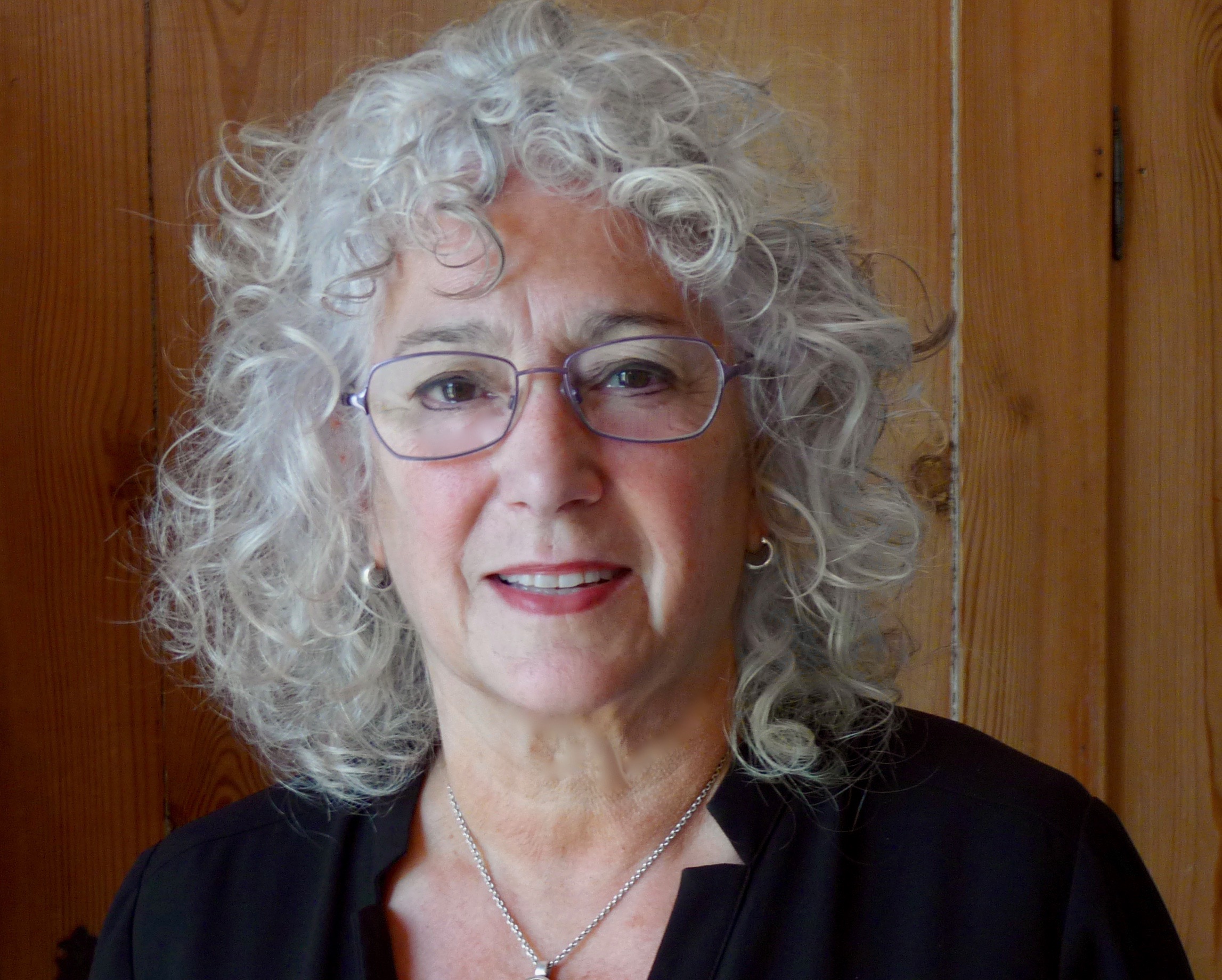
Jill Feldman held a teaching position for many years at the Zürcher Hochschule der Künste, the Royal Conservatory Den Haag, and has regularly held master classes and workshops for the Amici della Musica of Florence, for the Academia de Musica Antiga de Lisboa, the International Early Music Seminar - Tel Aviv, at the IYAP of Antwerp, at the Cursos Internacionales "Manuel de Falla" in Granada, in Japan and South Korea.
She studied singing with Lillian Loran in San Francisco and graduated from the University of California at Santa Barbara. Later she specialized in the field of early music in Basel under the guidance of Andrea Von Ramm.
She made her debut in three major productions: Monteverdi's Orfeo in Berkeley, California, the Erismena by Cavalli at the Festival dei Due Mondi in Spoleto, and the highly successful Ordo Virtutum of Hildegard von Bingen with the medieval group Sequentia.
From 1981 to 1986, Jill Feldman has sung with William Christie and Les Arts Florissants. With this ensemble, she recorded twelve albums including Marc Antoine Charpentier’s opera Médée in the title role, which received the Gramophone Award (London), Prix Charles Cros (Paris) and the Grand Prix du Disque (Montreux) in 1985 . Since then, she has taken part in over fifty recordings.
In 2003 she founded the record label Olive Music with her husband, Kees Boeke , for which they have recorded four medieval programs: Trecento (from Machaut to Ciconia), Chansons by Guillaume Dufay, O tu cara sciença mie musica (Squarcialupi Codex) and Chantilly Codex; Consort Songs by William Byrd and his contemporaries, Leçons de ténèbres by Charpentier, Delalande, Couperin, and "Songs" by Charles Ives.
Jill Feldman was invited by conductors such as Frans Brüggen (Die Schöpfung by Haydn), Andrew Parrot (Carmelite Vespers Handel), Jordi Savall (Motetti of Delalande), Nicholas McGegan (the cantata Tirsi Clori and Fileno and Handel's oratorium Susanna) and Rene Jacobs (l’Orontea by Cesti and Xerse by Cavalli). She has performed the role of Armida in Stradella’s Lo schiavo liberato at the Teatro di Modena and the role of Vita in La Vita Humana by Marrazzoli at the Tramway in Glasgow. In the field of contemporary music, she collaborated with the ensemble Duix with which she gave concerts at the Villa Medici in Rome, Santa Maria della Grazia in Milan, Cuenca in Spain and at the Ysbreker Festival in Amsterdam.
Claire Piganiol
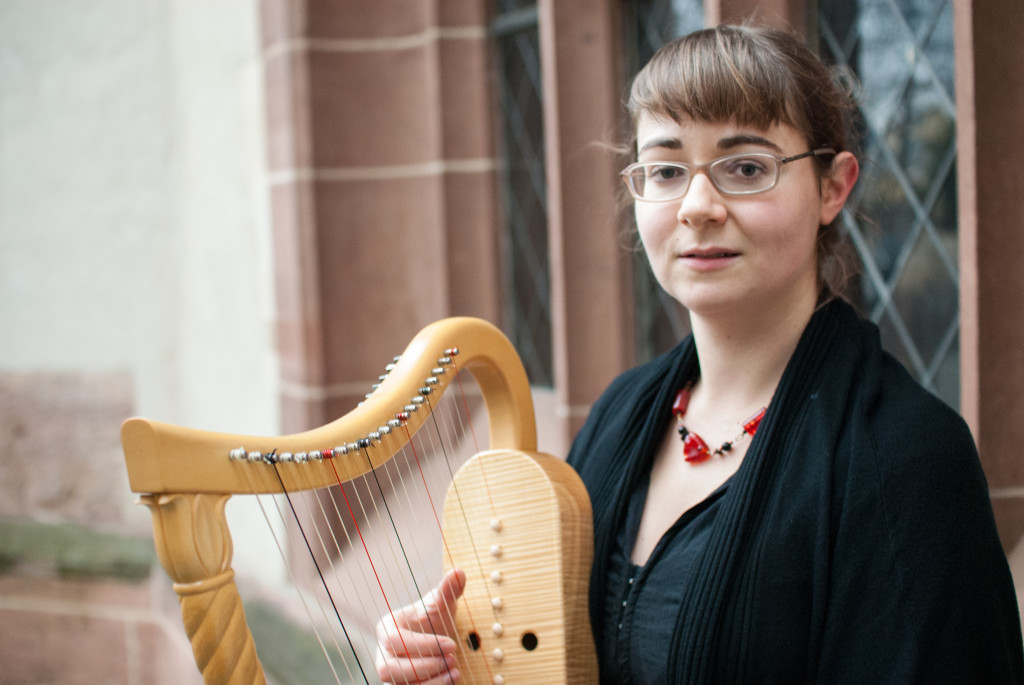
After starting her musical education on the piano, Claire Piganiol studied recorder and modern harp in the Conservatoire de la Vallée de Chevreuse near Paris (France), where she also discovered historical harps during the course of her studies. Her fascination for these rarely played instruments led her to musical studies in Milano, Toulouse and Basel, where she obtained a Master in early harps in 2012.
A Master in instruments from the Middle Ages and the Renaissance directed by Kees Boeke at the Musikhochschule Trossingen allowed her to specialize in this repertoire. Academic studies in history and in musicology (Maîtrise in Université Paris-Sorbonne, France) gave her the opportunity to start research work on the iconography, organology and playing techniques of her instruments.
Claire participates in several ensembles in France and abroad: ensembles Roselis, Isabella, Tetraktys, Gilles Binchois, Les Riches Heures, Centre de musique baroque de Versailles, I Ragazzari, Celacanto, Kesselberg…
She has performed at various venues, such as the festivals Oude Muziek Utrecht, Les Riches Heures Musicales de Simiane-la-Rotonde, Festival de Musique Ancienne d’Urbino, Wunderkammer Trieste, Festival de Davos, Festtage Basel, Festival International de Musiques Sacrées de Fribourg, Musiksommer am Zürichsee; the Opera of Lille, Luzerner Theater, Semperoper Dresden; castle of Versailles, Museum of the Middle Ages in Paris and in the Einsiedeln monastery. The Ensemble Duvinsela, with whom she plays the double harp, has won the first prize of the Biagio Marini competition in August 2014.
She is professor of historical harps at the CNR of Besançon and regularly leads introductory courses and workshops for early instruments; she is a member of the faculty of the International Course of Medieval Music Performance in Besalú, Spain, and the Laboratory for Historical Harps in Rangendingen, Germany.
Schedule
Application
The course is limited to 20 students. In the case that inscriptions exceed the number of available places, a selection will be made on the basis of the obligatory curriculum vitae and audio/video that must be attached to the entry form. You will be informed as soon as possible if you are accepted or rejected.
lessons with teachers of the courses of your choice; all collective lessons and participation in the final concert. Once your application has been accepted, you can proceed to registration and payment directly at Sands Music Room: https://sandsmusic.eventive.org/schedule/65b3d82112828f00cd50e7e3
Enrollment
To submit your application please complete the following form by September 1st, 2024.
The course is limited to 20 students. In the case that inscriptions exceed the number of available places, a selection will be made on the basis of the obligatory curriculum vitae and audio/video that must be attached to the entry form. You will be informed as soon as possible if you are accepted or rejected.
lessons with teachers of the courses of your choice; all collective lessons and participation in the final concert. Once your application has been accepted, you can proceed to registration and payment directly at Sands Music Room: https://sandsmusic.eventive.org/schedule/65b3d82112828f00cd50e7e3
Contacts

